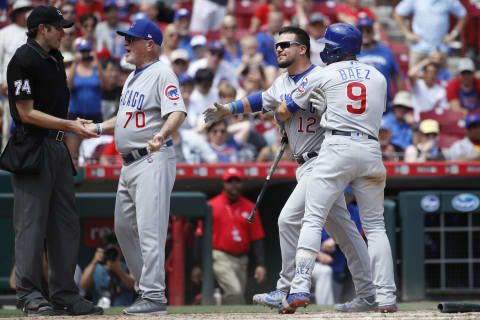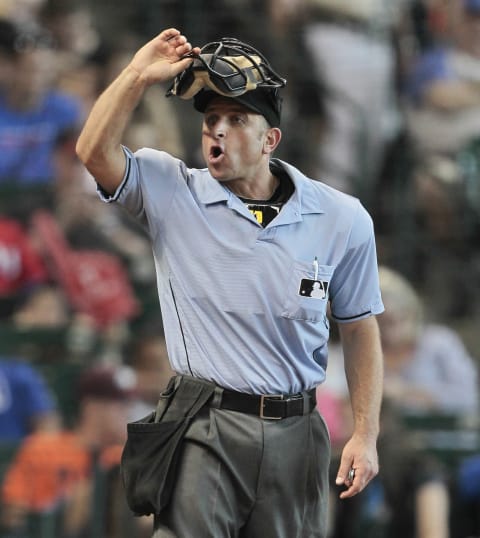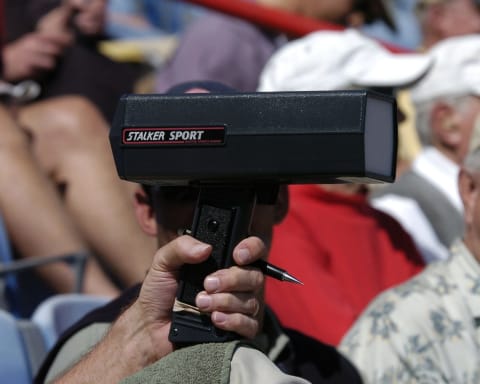Chicago Cubs: It’s time to activate the Electronic Strike Zone

Chicago Cubs and MLB players have been attacked by an onslaught of lousy umpire calls this past month. When will the Electronic Strike Zone be ready?
Last year, umpires were hounded in the media for their bad calls. In fact, your friendly neighborhood Chicago Cubs Scribe even talked about this here, Chicago Cubs: An electronic strike zone is coming to baseball.
Last season, Cubs’ utility player, Ben Zobrist‘ remark to a sideways call by umpire Phil Cuzzi reignited the conversation of the Electronic Strike Zone (ESZ). As reported, Zobrist said, ‘That’s why we want an electronic strike zone,’ to Cuzzi but wasn’t ejected until he returned to argue with Cuzzi between innings.
Earlier in that game, Cubs manager Joe Maddon was tossed for arguing calls as well, but Zobrist was the first player to be quoted during a game saying players want an Electronic Strike Zone (ESZ). It’s historical.
The Chicago Cubs were not alone last season as multiple MLB teams reported bad calls of umpires more than ever before; but why? Had umpires just gotten this bad overnight? Is this the product of a steady progression of bad calls throughout the years? Has the game gotten so competitive, that bad calls cannot be tolerated any longer? Should umpires be aided or replaced altogether?
Critics will say it’s been a mixture of all of these, but the ‘every game matters’ sentiment in the Chicago Cubs and other dugouts throughout baseball are making players and management hyper-aware of bad calls. This year, everyone is literally screaming (at umpires) for change. The most recent tirades at strike-callers are coming from Cubs’ outfielder, Kyle Schwarber and Philadelphia Phillies outfielder, Bryce Harper.

Activate the ESZ
In the Chicago Cubs most recent series against the Los Angeles Angels, Chicago Cubs outfielder Kyle Schwarber thought he was the recipient of a game-ending, critical check-swing call by the 3rd Base umpire. The check swing stranded two Cubs players on base and was the final nail in the Cubs coffin producing a game-ending strikeout for Schwarber. Robert Kuenster of SportsMoney reported:
Schwarber charged down the third base line to argue the call with Morales and had to be restrained by teammates. “If you’re not 100% sure, you can’t call it,” he said after the game on the controversial call made by Morales. “Obviously I was frustrated, but he’s not going to be frustrated that they end the game on a call like that and you’re that close to sniffing out a run. It’s frustrating. I just don’t think it was a good call.” More from Chicago Cubs News Cubs: Adrian Sampson is forcing his way into the conversation Projecting the Chicago Cubs bullpen to open the 2023 season Cubs fans are beginning to see the light at the end of the tunnel Justin Steele has evolved into a frontline starter for the Cubs The future of first base is murky right now for the Cubs
Philadelphia Phillies outfielder, Bryce Harper, was also the recent victim of an umpire’s bad calls. Harper voiced his frustration at several high balls called strike against him. Then he was called out on strikes looking. Not only did Harper suffer the bad calls, he got ejected four batters after he left the field of play in part due to the bad calls. Corey Seidman of WCAU NBC 10 Philadelphia reported:
Harper was upset during his own fourth-inning at-bat, which ended in a called strike three. One of the pitches to Harper was slightly out of the strike zone, up and away. Four batters later, Hernandez took a pitch high and out of the zone, even more so than the one to Harper. It was called a strike and Harper said something that was deemed by Carlson to be over the line. In a blink, and before any warning was issued, Harper was sent to the showers. “He made a comment when he was in the batter’s box and then he made a comment as he left the batter’s box after he struck out,” Carlson said after the game. “What he said warranted an automatic ejection.”
Harper was ejected due to his comments which stemmed from the umpire’s bad calls. In Schwarber’s case, a bad call ended the game with the Angels and handed the Northsiders a loss at home. Losses at home are not part of the Chicago Cubs 2019, “Every Game Matters,” Tour. Even Joe Maddon was ejected from a Chicago Cubs – Pittsburgh Pirates game earlier in April for arguing, you guessed it folks, balls and strikes.
Now is the time to activate the ESZ.

The ESZ is all about business
After I penned my positive article on the ESZ last year, many reporters decided to investigate further and draw their own conclusions. Forgive the baseball pun, but some of these guys were way ‘off base,’ like Kevin Paul Dupont of the Boston Globe, who racked up a couple of errors in his reporting like,
Contrary to Zobrist’s suggestion, there hasn’t been a groundswell among the Major League Baseball rank and file, a large portion of whom grew up on video games, to push for electronic umps.
Actually, many players and managers ‘are’ calling for the ESZ because the bottom line is that baseball is a game and a business. The business is losing at the cost of human error, and that won’t stand for any owner. Players want to make it to Cooperstown and need an accurate reflection of their tour at bat and aren’t getting that with human error. The simple fact that teams are now being manned with players that have been playing video games their whole life, make the current temperature very favorable for a change.
The other big mistake Dupont made was not looking further into what Major League Baseball Commissioner Rob Manfred told the New York Daily News about owners soon facing a decision about the technology. Dupont chose only to write about Manfred’s concerns over taking away the umpire’s role instead of reporting the news Manfred was making:
“I think we are much closer than we were a year ago to having the technological capability to actually call the strike zone,” Manfred said. “The accuracy is way up – way better than what it was a year ago. The technology continues to move… and it actually moved a little faster than I might have thought.”
I had suspected early on that MLB was going to make serious changes this season and the ESZ was going to be one of those changes. So it must have been surprising to Mr. Dupont of the Boston Globe when in February this year, MLB announced a three-year agreement that will allow MLB to use the independent Atlantic League as a test-bed for rules and equipment changes. Those include moving the pitcher’s mound and more importantly; using Trackman to call balls and strikes, essentially an ESZ.

The first step toward an ESZ has begun
Maybe I shouldn’t be too hard on the Boston Herald or Mr. Dupont as they have had their hands full with the slow start of last year’s World Champions. After all, you don’t think much is wrong with the world when you’re in first place and heading to the series. Now that the Red Sox have been humanized at seven games back, perhaps they too might benefit from the ESZ.
Over the years, I had heard about PITCHf/x, Hawk-Eye and Statcast but my knowledge of Trackman was limited to golf. For instance, the Trackman has been used in pro golf to help measure shots around a course but has also been around baseball for some time measuring ball and strikes.
AJ Dellinger recently wrote in Robot as reported by Engadget that:
The Atlantic League’s automated ump assistants will be powered by a radar system from TrackMan. The company uses Doppler technology to track and record the characteristics of a ball while its in motion. TrackMan is no stranger to baseball. According to the company, its technology is already used by MLB Advanced Media for ball tracking in its Statcast system. Many teams at the pro level in the US, Japan and Korea use the system, as do some top NCAA programs… It will discuss the possibility of adopting the system during the 2019 All-Star Break.
I believe it may be a long-shot to think we’ll see the technology by the All-Star break but wouldn’t it be marvelous to see that game managed with pure technology? Players could no longer be furious with umpires and would have to be furious with themselves, like golfers. Maybe similar to golfers, batters would then turn to blaming their equipment instead of themselves. Will we still use umpires to make the calls of Trackman or will the technology be used to confirm their calls? The phrase that “this technology will assist umpires” is not clear and is still very confusing for fans.
Next. Cubs' have guys trending in opposite directions. dark
Last season, I called for introducing this technology during the postseason, and although the 2019 All-Star break would be an amazing time to showcase this technology, again I’m shooting for the postseason where the games count. If there is this much concern about umpire calls so early in the season, how bad will this year’s postseason be? Considering that ‘every game matters’ this year for the Chicago Cubs, I bet Zobrist, Schwarber and Maddon would agree with me in saying, stock up on the Energizers and turn that thing on!